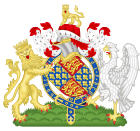De heretico comburendo facts for kids

|
|
| Citation | 2 Hen. 4. c. 15 |
|---|---|
| Dates | |
| Royal assent | 10 March 1401 |
| Other legislation | |
| Repealed by | Act of Supremacy 1558 |
|
Status: Repealed
|
|
| Text of statute as originally enacted | |
De heretico comburendo was a strict law passed in England in 1401. King Henry IV of England and the Parliament created it to stop a religious group called the Lollards. This law made it a crime to have beliefs that went against the main Church. People found guilty could be punished by burning at the stake. It was one of the toughest laws ever in England about controlling what people could say or read, especially about Lollard teachings and books.
What Does the Name Mean?
De heretico comburendo is a Latin phrase. It means "Regarding the burning of heretics." A "heretic" was someone whose religious beliefs were seen as wrong by the official Church. The law's name clearly showed its harsh purpose.
What the Law Said
This law stated that there were "false and strange people" who were teaching "new ideas" that went against the Church. These people were holding secret meetings and writing books. The law claimed they were trying to cause trouble and division among people. It said they were trying to overthrow the main Christian faith.
The law wanted these "wicked ideas" to stop completely. It ordered everyone who had books or writings with these forbidden ideas to give them to their local church leader within 40 days.
If someone did not hand over these books, they could be arrested. If they refused to give up their forbidden beliefs, or if they went back to them after promising to stop, they would be "burnt." This severe punishment was meant to scare others into obeying the law.
A Look at History
The Lollard movement started with the ideas of John Wycliffe. He was a smart thinker from the University of Oxford. Wycliffe wrote several books that inspired the Lollards. The government saw the Lollards as a threat to the King's authority. The Church saw their beliefs as wrong. The Lollards went even further than Wycliffe in some ways, openly rejecting the Church's power.
In March 1401, William Sawtrey became the first Lollard to be burned under this new law.
Later, in 1409, Archbishop Thomas Arundel created the Oxford Constitutions. These were more rules meant to punish people with forbidden beliefs in England. They were largely based on the ideas from De heretico comburendo.
In 1414, another law, the Suppression of Heresy Act 1414, made it clearer how people accused of heresy could be charged and brought to court by government officials.
The De heretico comburendo law was eventually removed. Section 6 of the Act of Supremacy 1558 (passed in 1559) got rid of this and similar laws. Finally, in 1677 in England and 1695 in Ireland, the power to use the writ (a legal order) for burning heretics was completely abolished.
Bibles in English
For hundreds of years, parts of the Bible had been translated into English. But in the 1380s, John Wycliffe led the creation of the first complete English Bibles. These are known as Wycliffe's Bibles. They were the first full translations to become widely used.
Interestingly, the De heretico comburendo law itself did not mention language or Bible translations. However, Church leaders in England were worried about Wycliffe's Bibles. They didn't just dislike some of the notes included with the Bibles. They also feared that having the Bible in English, without proper religious teaching, would make ordinary people misunderstand it. They worried this could lead people to reject the Church's authority and adopt forbidden beliefs. It's important to remember that De heretico comburendo was a law made by the English Parliament, not directly by the Church.
See also
- Britain in the Middle Ages
- History of the English Bible
- Inquisition
- Censorship of the Bible
 | Tommie Smith |
 | Simone Manuel |
 | Shani Davis |
 | Simone Biles |
 | Alice Coachman |

